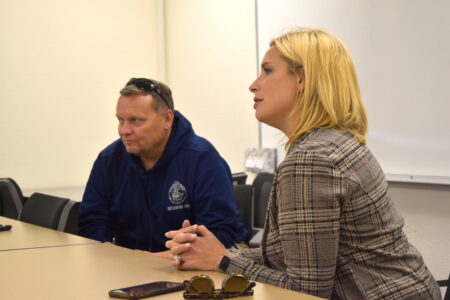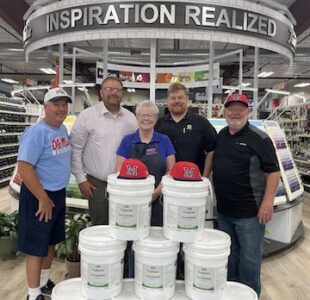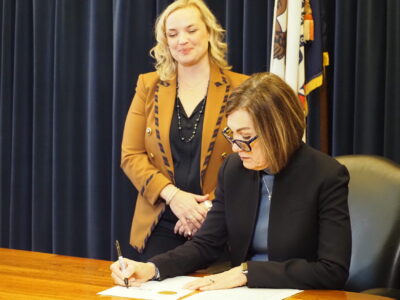Hinson holds roundtable with Drug Task Force, local law enforcement
U.S. Rep. Ashley Hinson (R-Iowa) made a stop at the Marshall County Sheriff’s Office Friday afternoon to discuss the efforts of the Mid Iowa Drug Task Force and the ways she could support them and local law enforcement in their mission to get drugs off the streets.
Hinson represents Iowa’s First District, and during Friday’s roundtable, she wanted to get a feel for what kind of problems the task force is facing and what kind of federal support they need to accomplish their goals. After some brief introductions, Marshalltown Police Chief Mike Tupper jumped off by discussing how much the task force relies on federal funding to conduct their investigations.
“We’re heavily reliant on federal funding for our drug task forces and for a lot of the drug investigations that we do, and without that federal funding, we would be in big trouble. And the problem is, the federal funding that we receive today really hasn’t gone up all that much or maybe — it’s probably a lot less actually, than it was maybe 10, 15 years ago,” Tupper said. “I have a Marshalltown investigator in the drug task force. I would love to put another one in there, but we need funding to make that happen.”
Tupper said there is certainly a need for more investigators in the task force, as there is plenty of work to be done in just Marshall County, let alone in Tama, Grundy and Hardin counties, which are also covered by the task force. Without more federal funding, however, it will be difficult to expand the team.
Hinson asked if having more individuals on the task force or having more funding was a higher priority, and Tupper said funding for drug task forces was of utmost importance.
“I think we need to put more money into drug task forces. That’s what I personally think needs to happen. There’s other programs available for cops, funding to hire officers if we need that. Finding funding to hire patrol officers isn’t a problem for me. I have that money. We just can’t find candidates,” Tupper said. “I think our drug task forces in the state of Iowa, they need more personnel resources, and they need more technology help.”
Task Force Supervisor Jim Gibson echoed Tupper’s sentiments on funding for technology, as a lot of the equipment that they use to conduct investigations, such as GrayKeys (a device used to unlock cell phones without a passcode) and GPS devices, can cost upwards of $10,000 a year.
Assistant Director of the Iowa Division of Narcotics Enforcement Ryan Moore took a similar position.
“The old joke used to be (that) we used to have a lot of people and no money. Now we have a little bit of money and no people. But, I mean, money always goes a long ways, because you know, these agents are out there working. They’re putting a lot of hours in,” Moore said.
Tupper also brought up fentanyl and the recent attention it has received in Congress. While he agreed it was a problem, he stressed that methamphetamine is far more prevalent in Marshall County, and that much of the supply that reaches Iowa comes from across the southern border.
“I’ve been doing this for 25 years. It’s the cheapest and the most dope I’ve ever seen, and everyone that’s sitting here will tell you,” Moore said. “It comes out of Mexico at $250 a pound. That’s insane cheap. When I was working cases when Joel (Phillips) did, it was $20,000.”
Hinson asked if drug cartels are active in the area, and she received an affirmative nod from everybody in attendance. She followed up by asking what the cartel’s recruitment process looks like and who they look for to distribute their product.
“I think they almost treat it just like any other business or organization would. They look for people that are reliable and trustworthy. They seek out people to take loads of methamphetamine, fentanyl, and they actively recruit people that can make them money and can sell their product,” Iowa Division of Narcotics Enforcement Special Agent in Charge Bryant Strouse said. “I would say in general, the majority of cases on the upper-level distribution of methamphetamine, the vast majority are directly related to the cartel in the state of Iowa.”
They also discussed how the drugs are being transported to Iowa, and Strouse said they reach the state in “any way you can possibly imagine.” Shipping drugs through the mail has become a problem also, through couriers like the United States Postal Service, UPS, FedEx and DHL, and they said often these organizations are uncooperative when it comes to investigations.
In addition, they discussed how the drugs are being sold over certain social media platforms such as Snapchat and other apps, as well as touching briefly on the role money laundering plays in the drug industry. After a little under an hour, Hinson thanked them for their time and candor on the topic.
“Thank you for peeling back the curtain a little bit for me. I appreciate it, and this is really good feedback for me,” Hinson said.
In a separate interview after the round table concluded, Hinson discussed some of the ways she would like to address the challenges brought up.
“I think, in general, when I hear what came out of this conversation today, I look at ‘OK, how can we stop the source of the problem?’ So, let’s focus on how do we control the issues at the southern border that are feeding this, you know, this pipeline. The secondary aspect is obviously what we talked about, which is resources for law enforcement, and making sure that they have the money they need to be able to complete these investigations, and then the accountability side, right, so making sure that we have the ability to follow through and actually put the bad guys away,” Hinson said.
Hinson said she would be looking into what she could do to solve the southern border issue and how she could help find funding for local law enforcement.
“The takeaway for me is, OK, where can I focus on policy that’s going to help make the most immediate impact, and for me, it’s OK, how can we control what the cartels are doing first, and then figure out, as a member of the appropriations committee, how can we continue to find grant opportunities to support local law enforcement?” Hinson asked.
Hinson is up for re-election this November, and if re-elected, she will no longer represent Marshall County due to redistricting. Instead, the county will move to the 4th District, however Hinson said she will continue to work to combat drugs in all areas of Iowa.
——
Contact Susanna Meyer
at 641-753-6611 or smeyer@timesrepblican.com.com
- T-R PHOTO BY SUSANNA MEYER — U.S. Rep. Ashley Hinson, right, and Marshalltown Police Chief Mike Tupper, left. Hinson visited the Marshall County Sheriff’s Office Friday afternoon for a roundtable with the Mid Iowa Drug Task Force to Discuss efforts to prevent drug use and distribution.
- T-R photo by Susanna meyer From right to left, Marshall County Sheriff Joel Phillips, Marshalltown Police Chief Mike Tupper and U.S. Rep. Ashley Hinson. Hinson discussed the work of the Mid Iowa Drug Task Force and ways she could help support it during a roundtable at the Marshall County Sheriff’s Office Friday afternoon.








